- KINGSTON TRIO – THE GUARD YEARS (Bear Family) (1997)
- BOB GIBSON – JOY! JOY! THE YOUNG AND WONDERFUL BOB GIBSON (Riverside) (1997)
- CHAD MITCHELL TRIO – THE CHAD MITCHELL TRIO COLLECTION (Varese Vintage) (1997)
- LIMELITERS: THE SLIGHTLY FABULOUS/SING OUT! (Collector’s Choice Music) (1997)
- ROGER McGUINN – LIVE FROM MARS (Hollywood)(1997)
In the late 1950s a folk revival brought work songs, gospel and social anthems into the pop charts. The music helped defined the era, providing a soundtrack after the first wave of rock and roll and prior to the British invasion. While that revival seemed short-lived, the music had been around for centuries, and continues to exist in everyone from Bruce Cockburn to Jewel and Ani DiFranco. The past year has seen a slate of reissues that put back on the shelves a number of the more popular acts of the era. Seemingly far removed from the rebellious spirit of Rock ‘n Roll, it’s hard to imagine that this music was once considered daring.
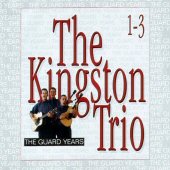 Easily the most successful group of the era, The Kingston Trio single-handedly kickstarted the revival. Dave Guard, Nick Reynolds and Bob Shane performed acoustic music that was simple and appealing. Taking from a wide range of sources, their repertoire included traditional folk songs, calypso, gospel, contemporary Broadway show tunes, old-time standards and humorous numbers. It all began with Tom Dooley. Released in September ‘58, by years’ end the song had hit #1 and sold over 6 million copies. This was fresh, intelligent music, totally unlike anything the crooners and rockers then battling it out on the airwaves were offering. Employing a well-scrubbed crew cut/striped-shirt look the trio mixed hilarious repartee with first rate vocalizing. Making folk music safe for the whole family they were careful to remove any sense of subversion that their more politically-oriented precursors like Woody Guthrie and the Weavers were known for. Even when they ventured into slightly more risqué material, it was done with humor and style, certainly nothing Mom and Pop wouldn’t forgive.
Easily the most successful group of the era, The Kingston Trio single-handedly kickstarted the revival. Dave Guard, Nick Reynolds and Bob Shane performed acoustic music that was simple and appealing. Taking from a wide range of sources, their repertoire included traditional folk songs, calypso, gospel, contemporary Broadway show tunes, old-time standards and humorous numbers. It all began with Tom Dooley. Released in September ‘58, by years’ end the song had hit #1 and sold over 6 million copies. This was fresh, intelligent music, totally unlike anything the crooners and rockers then battling it out on the airwaves were offering. Employing a well-scrubbed crew cut/striped-shirt look the trio mixed hilarious repartee with first rate vocalizing. Making folk music safe for the whole family they were careful to remove any sense of subversion that their more politically-oriented precursors like Woody Guthrie and the Weavers were known for. Even when they ventured into slightly more risqué material, it was done with humor and style, certainly nothing Mom and Pop wouldn’t forgive.
The group’s first five studio albums all reached the peak position on the sales charts, a feat yet to be repeated. Coupled with singles like A Worried Man, Scotch and Soda, MTA, and Tijuana Jail they were unstoppable.
Too many people have laughed off the Trio’s contributions. It’s true this ain’t as deep as Leadbelly or Woody, but it was never intended to be. It’s the sound of three college boys doing what they loved. As such it’s honest music. Folk music for the bourgeois. A major influence on much of what would eventually render them obsolete, everyone from Bob Dylan to the Beach Boys and Lindsay Buckingham (Fleetwood Mac) have cited them as influences. If the group sounded overly corny, remember we’re in the 90s now. 40 years ago this music rang true. They were perfect for the times. One listen will suspend any doubts as to musical chops. These guys could sing most anyone under the table. For all the sense of relaxed attitude, from stage patter to arrangements, everything was rigorously rehearsed.
This massive 10 disc box set from Germany’s Bear Family clocks in at well over 10 hours playing time. With 240 tracks it includes everything recorded by the group from it’s first demos in 1957 through to leader Dave Guard’s final recordings with the group in January ‘61. In addition to previously released material there’s four complete concerts, numerous curios (including 24 commercials for 7-Up), a TV broadcast and, in addition to four Trio reads on Tom Dooley, seven versions by others, from the original 1929 recording by Grayson & Whitter through to such absurdities as Merle Kilgore’s Tom Dooley, Jr. and various attempts to rock the song up.
There’s plenty of gospel material. Good News, first popularized by the Trio, was subsequently covered by everybody from Vic Dana to Randy Stonehill. Their traditional concert closer When The Saints Go Marching In caps all four shows as well as turning up on a previously unreleased studio outing. The groups’ 1960 Christmas album, The Last Month of the Year offers well crafted numbers that work year round. One of their finest albums, rather than offer typical holiday fare the group dug up some rarely heard items. Mary Mild, The White Snows Of Winter (based on Brahm’s First Symphony) and the Spanish carol Follow Now, Oh Shepherds are standouts.
A 108 page oversized hard cover book contains a history of the Guard years, annotation on every track, plenty of photos, and even a four page essay on Tom Dooley, the man, the song, and the motion picture.
The trio continued on until 1967 with John Stewart replacing Guard, who passed away in 1991. Bear Family has announced two additional box sets of Stewart era recordings.
Lou Gottlieb, who in addition to writing much of the “spontaneous” stage patter heard on early Kingston Trio shows, brought the group such material as Good News and ‘Round About the Mountain. He formed The Limeliters in 1959 with Glenn Yarbrough and Alex Hassilev. The group hit the top ten with their first RCA album, Tonight: In Person. Collector’s Choice has reissued the trio’s third album, 1961’s Slightly Fabulous and the following years’ Sing Out! on one disc.
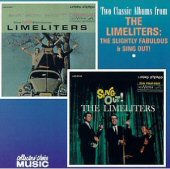 The Limeliters emphasized humour even more than the Kingston Trio. Gunslinger offers a decidedly modern read on the classic old west villain: “Did you come from a broken home on the range?” On the live Slightly Fabulous Gottlieb’s irreverent introductions can last as long as the song, much to the audience’s delight. The group always included gospel numbers on their LPs, and recorded an entire album of sacred material, Makin A Joyful Noise (not yet on CD). These two releases offer an ample helping of spirituals (including Bob Gibson’s A Wayfaring Stranger).
The Limeliters emphasized humour even more than the Kingston Trio. Gunslinger offers a decidedly modern read on the classic old west villain: “Did you come from a broken home on the range?” On the live Slightly Fabulous Gottlieb’s irreverent introductions can last as long as the song, much to the audience’s delight. The group always included gospel numbers on their LPs, and recorded an entire album of sacred material, Makin A Joyful Noise (not yet on CD). These two releases offer an ample helping of spirituals (including Bob Gibson’s A Wayfaring Stranger).
Yarbrough left the Limeliters in 1963, achieving solo success with Baby The Rain Must Fall two years later. Near the turn of the decade the trio reformed for an obscure album on Warner Bros. The LP includes quotes from each member that reflect the era to a “T.” Yarbrough tells of his goal to found “a school for orphans, to be international in representation and experimental in curriculum.” Gottlieb, dressed in flowing robe and sporting long hair and beard reveals the true meaning of original sin is exclusive ownership of land: “No Trespassing” signs are the cause of war, racial strife, and marital unhappiness. Those who doubt the truth of this revelation can test it easily: put a Morning Star (an eight-pointed star) in the window of your home to indicate that it stands on land-access-to-which-is-denied-no-one and watch what happens.” Gottlieb lived his convictions, allowing hundreds of hippies to live on his property for free. He eventually deeded the land back to God, an action which resulted in California officials challenging in court the right of God to own land. These days it’s too easy to laugh at such seemingly dated ideals, but by all accounts these were men who lived out their convictions. Gottlieb died last year at age 71.
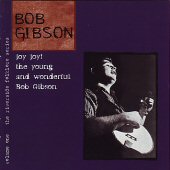 Bob Gibson was one of the most original and influential voices of the folk boom. Despite never achieving the popularity of his peers, he was held in such esteem that virtually everyone acknowledged him as an indispensable player. This package, the first Gibson retrospective released on CD, is made up of material from his first four LPs, recorded between ‘56-58, before the Kingston Trio had even set foot into a recording studio. Many of the songs first heard here would go on to become standards. Abilene, Drill Ye Tarriers, and Easy Rider all became hits for other artists. Standout tracks include ‘Ol Bill and John Riley, later covered by Joan Baez (who Gibson introduced to the world at the Newport Folk Festival in 1959), The Limeliters, and the Byrds. Gospel was an important ingredient to any hootenanny, and there’s plenty here: camp standards like Joy Joy (I got Joy down in my heart), This Train, This Little Light, The Virgin Mary Had One Son, There’s A Meetin’ Here Tonight, and Mighty Day.
Bob Gibson was one of the most original and influential voices of the folk boom. Despite never achieving the popularity of his peers, he was held in such esteem that virtually everyone acknowledged him as an indispensable player. This package, the first Gibson retrospective released on CD, is made up of material from his first four LPs, recorded between ‘56-58, before the Kingston Trio had even set foot into a recording studio. Many of the songs first heard here would go on to become standards. Abilene, Drill Ye Tarriers, and Easy Rider all became hits for other artists. Standout tracks include ‘Ol Bill and John Riley, later covered by Joan Baez (who Gibson introduced to the world at the Newport Folk Festival in 1959), The Limeliters, and the Byrds. Gospel was an important ingredient to any hootenanny, and there’s plenty here: camp standards like Joy Joy (I got Joy down in my heart), This Train, This Little Light, The Virgin Mary Had One Son, There’s A Meetin’ Here Tonight, and Mighty Day.
For a variety of reasons, Gibson never reaped the benefits of his legendary status. Recording sporadically over the years, he achieved a degree of success after forming a duo with actor/singer Hamilton Camp, but for the most part he remained unknown outside of the folk community.
Suffered from a form of Parkinson’s disease, Gibson arranged a farewell party/wake for himself last year, and sporting a button reading “I’m not dead yet” visited with friends and collaborators. A week later he had passed on at age 61.
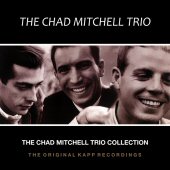 The Chad Mitchell Trio first caught the public’s attention through an appearance on Harry Belafonte’s 1960 album Belafonte Returns To Carnegie Hall (whose liner notes described them as “stirring representatives of the modern college crew-cut trio genre”). Emphasizing pointed political satire (The John Birch Society) rather than social or spiritual matters, in general the music has not aged well. Attempts at serious material like Bob Dylan’s Blowin’ In the Wind, which they recorded before Peter, Paul and Mary, often comes across as too mannered. A number of tracks bring to mind The Folksmen, a brilliant parody folk group from the creators of Spinal Tap.
The Chad Mitchell Trio first caught the public’s attention through an appearance on Harry Belafonte’s 1960 album Belafonte Returns To Carnegie Hall (whose liner notes described them as “stirring representatives of the modern college crew-cut trio genre”). Emphasizing pointed political satire (The John Birch Society) rather than social or spiritual matters, in general the music has not aged well. Attempts at serious material like Bob Dylan’s Blowin’ In the Wind, which they recorded before Peter, Paul and Mary, often comes across as too mannered. A number of tracks bring to mind The Folksmen, a brilliant parody folk group from the creators of Spinal Tap.
Collection culls 17 selections from the Trio’s three LPs released on Kapp Records. For those albums the group consisted of Mitchell, British Columbia native Mike Kobluk, Joe Frazier, and on 14 of the 17 tracks, Roger McGuinn on guitar and banjo. The disc includes two gospel tunes, Bob Gibson’s You Can Tell The World and Mighty Day. John Denver would replace the departing Mitchell in 1965, recording a number of LPs with the group before embarking on his own flourishing solo career a few years later. Overall the Mitchell Trio comes across as a considerably weaker version of Kingston Trio. Guess you had to be there for this one.
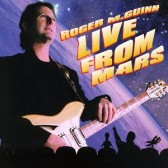 Roger McGuinn made his name as leader of The Byrds, one of America’s all-time great pop groups. Live From Mars takes the listener on an audio history of McGuinn’s career. More than a live album, it’s akin to a musical autobiography. As such it illustrates just how far he’s traveled over the last 4 decades. At over an hour, the disc is jammed with hits, misses and fascinating anecdotes. From the folk clubs of Chicago, where he fell under the spell of Bob Gibson, we move on to his first professional gig, playing banjo for the Limeliters, who had hired McGuinn unaware he was still in high school- they had to wait until he graduated to take him on the road. He soon moved on to the same position with the Chad Mitchell Trio, and later Bobby Darin. Among the sillier moments is a rendition of Darin and McGuinn’s stab at surf music, Beach Ball.
Roger McGuinn made his name as leader of The Byrds, one of America’s all-time great pop groups. Live From Mars takes the listener on an audio history of McGuinn’s career. More than a live album, it’s akin to a musical autobiography. As such it illustrates just how far he’s traveled over the last 4 decades. At over an hour, the disc is jammed with hits, misses and fascinating anecdotes. From the folk clubs of Chicago, where he fell under the spell of Bob Gibson, we move on to his first professional gig, playing banjo for the Limeliters, who had hired McGuinn unaware he was still in high school- they had to wait until he graduated to take him on the road. He soon moved on to the same position with the Chad Mitchell Trio, and later Bobby Darin. Among the sillier moments is a rendition of Darin and McGuinn’s stab at surf music, Beach Ball.
Shortly after, McGuinn saw the Beatles’ first feature film, A Hard Day’s Night, and was turned around musically. He hooked up with two like-minded folkies who shared his enthusiasm, David Crosby and Gene Clark, and together they formed the Beefeaters, soon to become the Byrds. Adding a rhythm section and electric guitars (including McGuinn’s trademark Rickenbacker 12 string), the group forged a sound that merged folk with rock and roll. The groups’ first single, Bob Dylan’s Mr. Tambourine Man was released in 1965 and went all the way to number one, ushering in the folk rock era. Originally disdained by folk purists for turning their music into teenybopper fodder, the changes the Byrds brought on are still felt today from REM and Tom Petty through to the current No Depression scene.
We get a generous sampling of Byrds material, including the groups’ second #1 hit, Turn Turn Turn, (based on the Book of Ecclesiastes), and McGuinn’s Mr. Spaceman, which was decades ahead of it’s time, feeling right at home in the X-Files world we now inhabit.
A Christian for nearly twenty years, McGuinn rarely discusses his faith publicly. To those who may be concerned as to the “Christian” content of his work, which is seldom overt in proclaiming the gospel, a recent interview sheds some light. Asked for advice to new players: “To young Christian musicians, I would say to listen to the Lord and do what He wants you to do with your gift. In my case, I received that I should stay where I was when I was called.” It’s ironic that the material most clearly expressing the gospel, such as I Am a Pilgrim, Farther Along, The Christian Life, and Glory,Glory were all recorded before his conversion: “We just recorded those songs for their musical value at the time. Chris (Hillman) was responsible for the early ones. Gene Parsons found Jesus Is Just Alright on an Art Reynolds album.” McGuinn includes two new original songs on Live. Recorded as a bonus studio track with The Jayhawks, May The Road Rise, based on a traditional Irish blessing, eloquently expresses his faith.
McGuinn is a frequent visitor to the internet Byrds music group (alt.music.byrds), where he welcomes newcomers and answers all manner of questions personally.
© John Cody 1998
